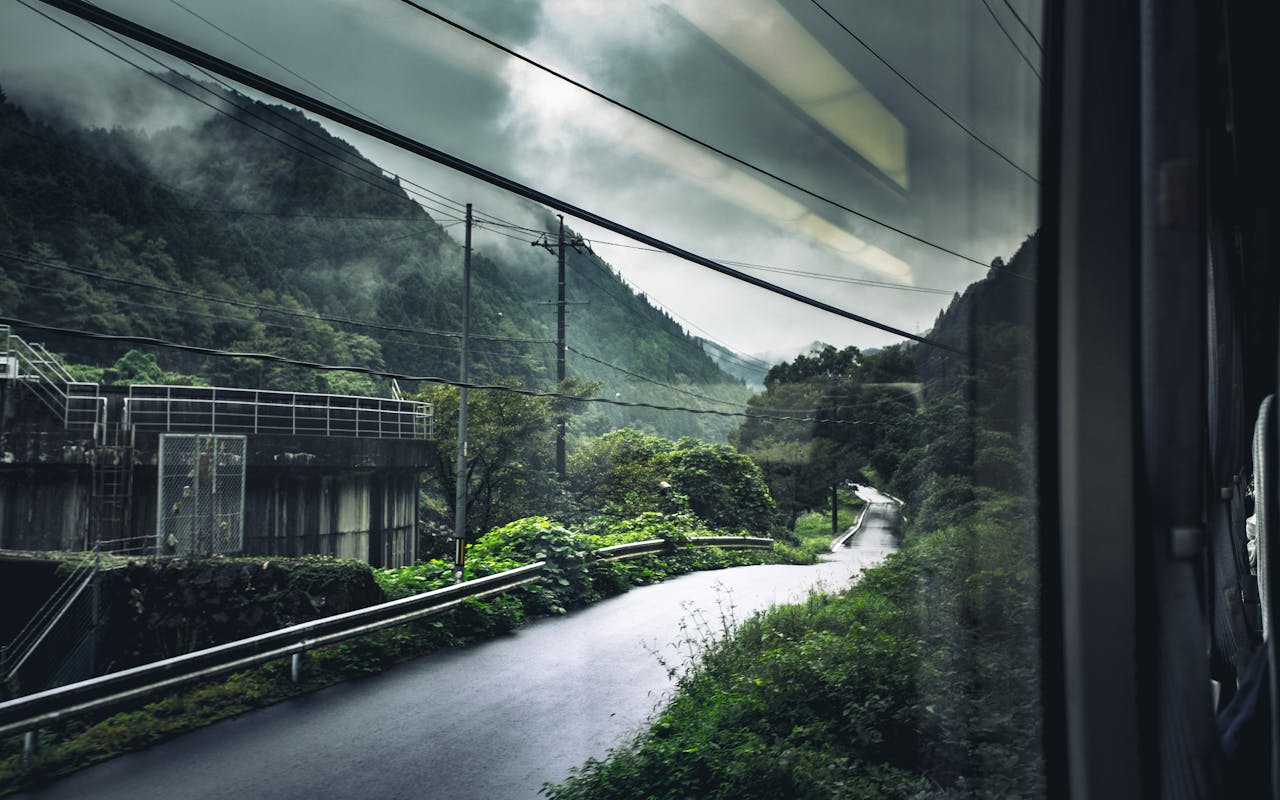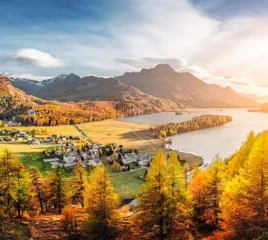Note that iPhone devices from Mainland China aren’t eSIM compatible. Also iPhone devices from Hong Kong and Macao aren’t compatible (except for iPhone 13 Mini, iPhone 12 Mini, iPhone SE 2020 and iPhone XS)
Japan’s bullet trains, or Shinkansen, are more than just a way to get around—they’re an experience. Whether you’re zipping past Mount Fuji or gliding along the coastline, these trains offer a front-row seat to some of the country’s most stunning landscapes. They’re fast, and efficient, and make exploring Japan incredibly convenient. If you’ve ever wondered what makes these trains so special, this guide is for you.
Discovering the Beauty of Japan’s Scenic Bullet Train Rides
Top Routes for Stunning Views
When it comes to the best train journeys in Japan, the Shinkansen routes are in a league of their own. Imagine gliding past Mount Fuji on the Tokaido Shinkansen or watching the sun dip into the Seto Inland Sea on the Sanyo Shinkansen. These routes aren’t just about getting from point A to B—they’re about the views that make you pause and appreciate the journey itself. Some of the most popular scenic routes include:
- Tokaido Shinkansen: Famous for its postcard-perfect view of Mount Fuji.
- Sanyo Shinkansen: Offers breathtaking coastal scenery along western Honshu.
- Hokkaido Shinkansen: A winter wonderland, especially magical during snowfall.
Each of these routes brings its own charm, whether it’s the lush greenery of summer or the fiery reds of autumn leaves.
Seasonal Highlights Along the Tracks
Japan’s seasons add another layer of magic to bullet train experiences in Japan. In spring, cherry blossoms blanket the landscape, creating dreamy pink corridors along the tracks. Summer brings vibrant green rice fields and glistening rivers, while autumn dazzles with shades of red, orange, and gold. Winter, of course, turns everything into a serene snowy escape. Here’s a quick breakdown:
| Season | Highlights Along the Tracks |
| Spring | Cherry blossoms and blooming flowers |
| Summer | Lush greenery and sparkling rivers |
| Autumn | Fiery autumn foliage |
| Winter | Snow-covered landscapes |
No matter when you travel, the scenery from your train window will feel like a moving postcard.
Cultural Landmarks Accessible by Train
One of the coolest perks of traveling by Shinkansen is how easily you can reach Japan’s cultural gems. From Kyoto’s historic temples to Hiroshima’s Peace Memorial Park, these trains connect you to some of the country’s most iconic spots. Here’s a quick list of must-visit landmarks:
- Kyoto: Known for its stunning temples and traditional tea houses.
- Himeji Castle: A UNESCO World Heritage site accessible via the Sanyo Shinkansen.
- Nikko: Famous for its ornate shrines and natural beauty.
Whether you’re chasing history, nature, or just a good view, Japan’s bullet trains make it all possible. They’re more than transportation—they’re an experience in themselves. Don’t miss out on the amazing traditional mouth-watering Japanese dishes while you are in Japan.
The Engineering Marvels Behind Japan’s Bullet Trains
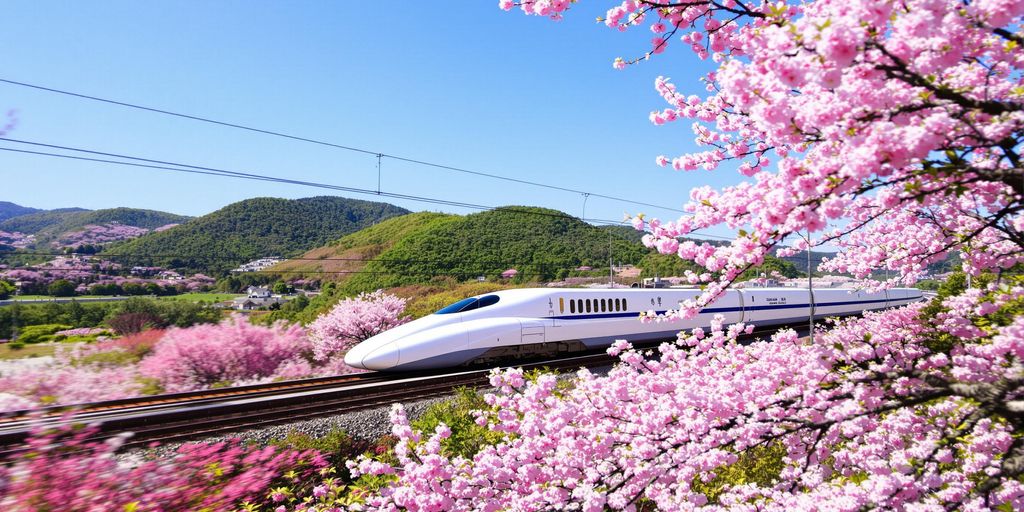
How Shinkansen Changed Travel in Japan
When the Shinkansen, or “bullet train,” launched in 1964, it wasn’t just a new way to get around—it was a revolution. Before this, train travel in Japan was much slower, and long-distance trips could take an entire day. The Shinkansen flipped the script, cutting travel times dramatically. For example, the trip from Tokyo to Osaka, which used to take nearly seven hours, was slashed to just four. This innovation didn’t just save time; it reshaped how people thought about travel altogether. Suddenly, commuting between cities became practical, and regions across Japan felt more connected than ever.
Sustainability and Innovation in Rail Technology
Japan’s bullet trains aren’t just fast—they’re also incredibly efficient. Engineers have fine-tuned these trains to reduce energy use without sacrificing speed. The aerodynamic design of the trains minimizes air resistance, while regenerative braking systems actually convert braking energy back into electricity. Sustainability is baked into the system, with many Shinkansen lines powered by renewable energy sources. Plus, Japan is always looking ahead, experimenting with maglev technology that could make trains even faster and greener in the future.
The Role of Speed and Comfort in Modern Travel
Speed is the headline-grabber, but comfort is what keeps people coming back. Shinkansen trains are designed with spacious seating, quiet cabins, and smooth rides that make even long trips enjoyable. Travelers can relax, enjoy onboard amenities, or simply gaze out at Japan’s stunning landscapes through large windows. And it’s not just about the passengers—these trains run so precisely that delays of even a minute are rare. This combination of speed, comfort, and reliability has made the Shinkansen a symbol of modern travel, blending practicality with a touch of luxury.
The Shinkansen isn’t just a train; it’s a testament to what happens when technology, design, and vision come together to redefine an entire nation’s way of life.
Immersive Experiences on Japan’s Scenic Railways
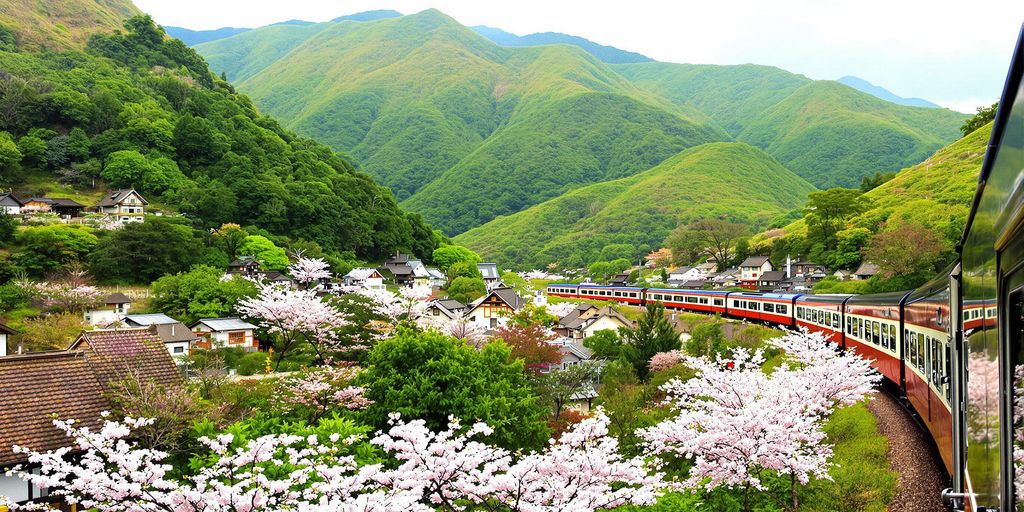
Onboard Amenities and Services
Traveling on Japan’s scenic railroads isn’t just about the views; it’s also about the journey itself. Bullet trains and specialty scenic rail rides offer amenities that make the ride enjoyable and comfortable. You’ll find reclining seats with plenty of legroom, spacious windows for soaking in the views, and even footrests on some trains. Many trains also provide free Wi-Fi, so you can stay connected while enjoying the ride.
For those traveling long distances, some scenic railways include sleeping compartments or private cabins. These spaces are perfect for overnight trips, especially on routes like the Kyoto Sagano Scenic Railway. Don’t forget to check out the vending machines and snack carts onboard, offering everything from local treats to refreshing beverages.
Specialty Trains for Unique Journeys
Japan has a knack for creating unforgettable train experiences. Specialty trains, like the luxurious “Seven Stars” in Kyushu or the playful “Pokemon With You Train,” add a unique twist to your travel. These trains often feature themed interiors, gourmet dining options, and even live performances.
One standout is the Kyoto Sagano Scenic Railway. This train takes you through lush forests and alongside rivers, offering a peaceful and picturesque escape from city life. Specialty trains often require advance booking, so plan ahead if you want to snag a seat.
Dining and Shopping While Traveling
Food and shopping are integral parts of any Japanese train journey. Many scenic rail rides feature onboard dining cars serving bento boxes filled with regional specialties. Try a seafood bento on coastal routes or a mountain vegetable bento when traveling through the countryside.
For shopping enthusiasts, some trains have onboard stores selling souvenirs, local crafts, and even limited-edition train merchandise. You can also pick up unique items at station kiosks during stops. It’s a great way to take home a piece of your journey.
Whether you’re riding in luxury or enjoying a simple bento, Japan’s scenic railroads make the journey as memorable as the destination.
Planning Your Ultimate Rail Journey Across Japan
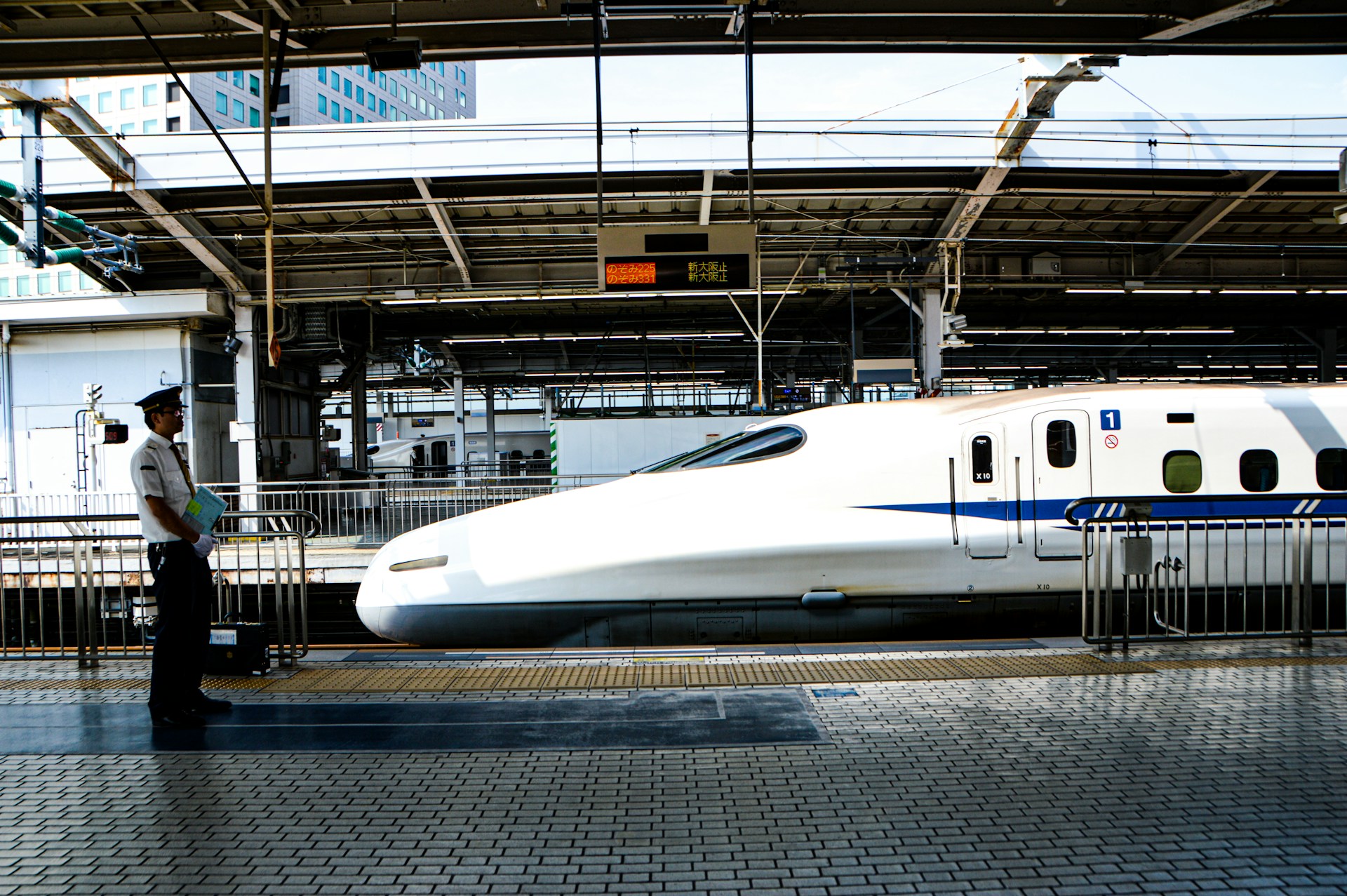
Choosing the Right Rail Pass
If you’re exploring Japan by rail, picking the right rail pass is like choosing your travel buddy—it can make or break your trip. The Japan Rail Pass is the go-to option for most visitors, offering unlimited rides on JR trains, including the famous Shinkansen. But wait, there’s more! Regional passes like the JR Kansai Wide Area Pass or JR East Pass might be better if you’re sticking to specific areas. Here’s a quick comparison:
| Pass Type | Coverage Area | Price (Approx.) | Validity |
| Japan Rail Pass | Nationwide | $250 (7 days) | 7, 14, 21 days |
| JR Kansai Wide Pass | Kansai Region | $70 (5 days) | 5 days |
| JR East Pass | Eastern Japan | $150 (5 days) | Flexible 5 days in 14 |
Pro tip: Consider where you’ll be traveling most and calculate if the pass will save you money compared to individual tickets.
Tips for Booking and Navigating Stations
Japanese train stations can feel like mazes, especially the big ones like Tokyo or Osaka. Don’t sweat it—just follow these steps:
- Book your tickets early. Use ticket machines or visit the JR office for help. English-speaking staff are usually available.
- Arrive with time to spare. Stations can be busy, and finding your platform might take longer than expected.
- Look for signs in English. Most major stations have them, but having Google Maps or a translation app handy doesn’t hurt.
And hey, if you’re ever lost, don’t hesitate to ask for help. Japanese station staff are incredibly polite and helpful.
Packing Essentials for Train Travel
Packing smart can make your rail journey a breeze. Here’s what you shouldn’t leave behind:
- Portable charger: Trains have outlets, but not always in every seat.
- Snacks and drinks: While some trains have food carts, it’s always good to have your favorites.
- Light luggage: Overhead racks can only hold so much, so pack light if possible
Traveling by train in Japan isn’t just about getting from A to B. It’s an experience—watching the countryside roll by, sipping green tea, and feeling the hum of the Shinkansen under your feet.
Whether you’re a first-timer or a seasoned traveler, planning ahead for Japan travel ensures you’ll enjoy every moment of your rail adventure.
Stay Connected Even on a Scenic Train Ride
Experience hassle-free connectivity wherever you travel in Japan.
Connecting with Nature Through Japan’s Scenic Train Routes
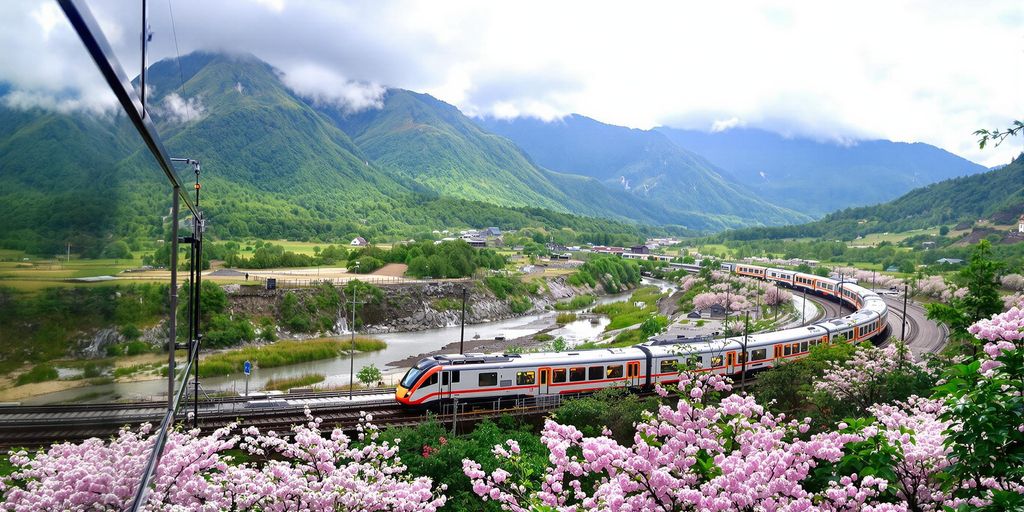
Exploring Mountainous Landscapes by Train
Japan’s mountainous terrain is a treasure trove of breathtaking views, and what better way to soak it all in than from the comfort of a train? The winding tracks that snake through valleys and climb steep inclines offer a front-row seat to nature’s drama. Some must-ride routes include the Tateyama Kurobe Alpine Route, known for its towering snow walls in winter, and the JR Tadami Line, which glides through dense forests and over picturesque bridges. If you’re lucky, you might even catch a glimpse of a hidden waterfall or a shy deer peeking through the trees.
Coastal Views and Oceanfront Tracks
Few experiences compare to the serenity of watching the ocean stretch endlessly on one side while the train hugs the coastline. The JR San’in Line, for instance, offers stunning views of rugged cliffs and peaceful beaches. Another gem is the Shimonada Station on the Yosan Line, often called the most romantic station in Japan. Imagine gazing at the sunset over the water as the train gently rocks you along—pure magic. Don’t forget your camera; you’ll want to capture these moments.
Seasonal Foliage and Blossoms Along the Way
Japan’s trains are famous for their seasonal charm. In spring, the tracks are lined with cherry blossoms, creating tunnels of pink and white. Autumn, on the other hand, bathes the landscape in fiery reds and oranges. The Sagano Scenic Railway in Kyoto is a favorite for fall foliage, while the Gono Line offers panoramic views of both cherry blossoms and snowy landscapes, depending on when you go. Seasonal train rides aren’t just about the scenery—they’re about feeling in sync with nature’s rhythms, one stop at a time.
There’s something uniquely calming about watching the world go by from a train window. Whether it’s mountains, oceans, or trees dressed in seasonal colors, these routes remind us to slow down and appreciate the beauty around us.
Cultural Insights Gained from Japan’s Rail Adventures
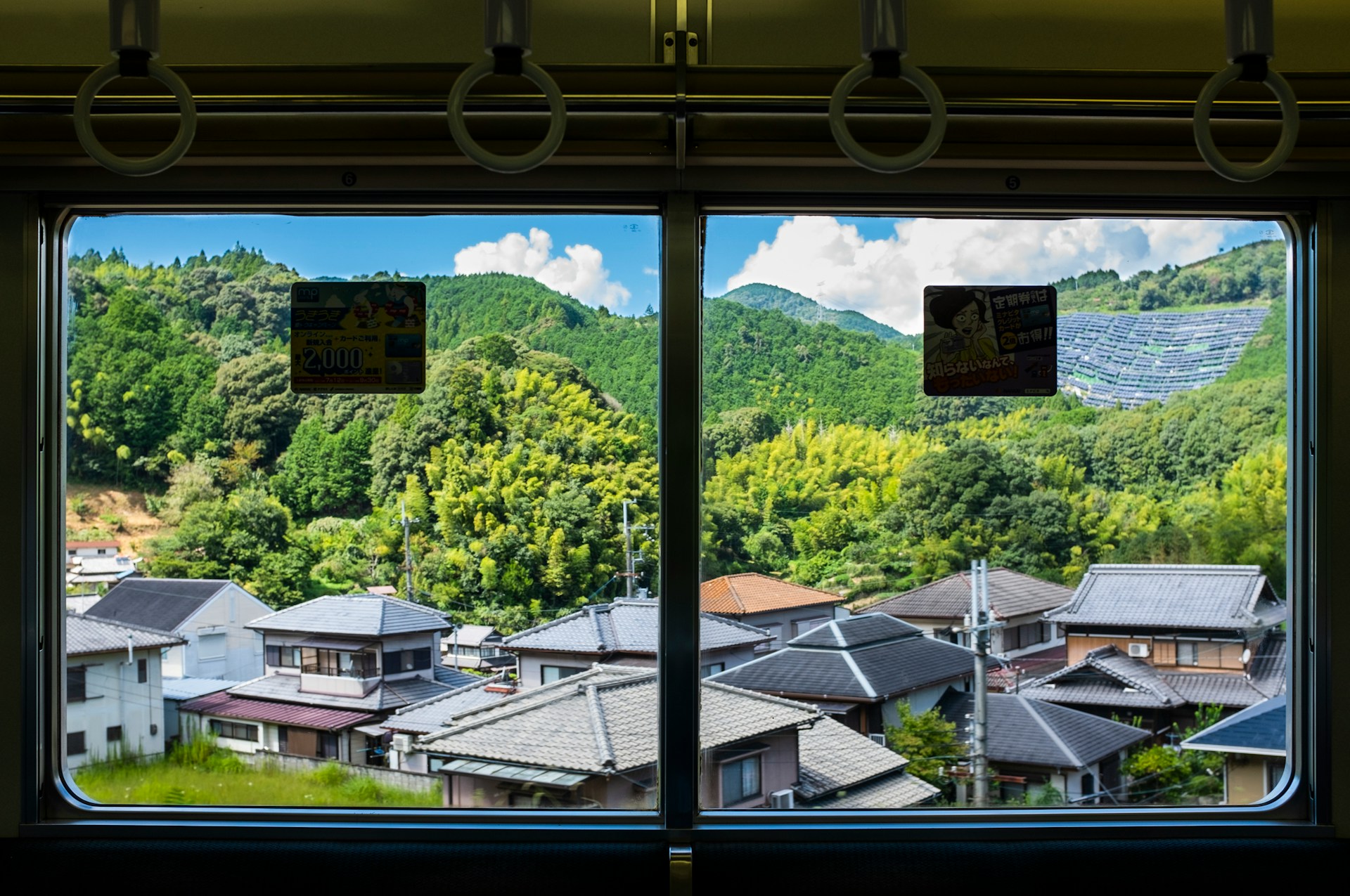
Traditional Festivals Accessible by Train
One of the best parts of traveling by train in Japan is how easy it is to reach some of the country’s most vibrant traditional festivals. From the snowy streets of Sapporo during the Snow Festival to Kyoto’s elegant Gion Matsuri, the rail network connects you to these cultural gems without the stress of driving or parking. Many trains even add festive touches during these times, like special decorations or announcements about the events. Here are a few must-visit festivals you can access by train:
- Aomori Nebuta Matsuri: Take the Tohoku Shinkansen to Aomori and immerse yourself in this summer festival of illuminated floats.
- Takayama Autumn Festival: Hop on the Hida Limited Express to Takayama for a celebration featuring ornate floats and traditional music.
- Kyoto’s Gion Matsuri: Easily accessible by multiple rail lines, this festival is a showcase of Kyoto’s rich history and culture.
Historical Sites Along the Railways
Japan’s train routes aren’t just about getting from point A to point B—they’re a journey through time. Many historical landmarks are just a short walk or bus ride from major stations. For instance:
- Himeji Castle: A short walk from Himeji Station on the Sanyo Shinkansen line, this UNESCO World Heritage site is a must-see.
- Nikko’s Shrines and Temples: Accessible via the Tobu Railway, these sacred sites are steeped in history and surrounded by natural beauty.
- Hiroshima’s Peace Memorial Park: A poignant reminder of history, just minutes from Hiroshima Station.
Local Cuisine and Regional Delicacies
Train travel in Japan is also a culinary adventure. Each region has its own specialties, and many stations are famous for their “ekiben”—boxed meals sold at train stations. These aren’t your average packed lunches; they’re carefully crafted meals that showcase local flavors. For example:
| Region | Specialty Ekiben |
| Hokkaido | Crab and seafood bento |
| Niigata | Rice-focused meals |
| Kyushu | Pork-based dishes like tonkatsu |
Some trains even have dining cars or onboard vendors offering snacks and drinks unique to the region you’re passing through. Don’t miss the chance to try these local treats—they’re a delicious way to connect with Japan’s diverse food culture.
Traveling by train in Japan is more than just a way to get around. It’s a window into the country’s traditions, history, and culinary treasures, all while enjoying the comfort and efficiency of one of the world’s best rail systems.
The Future of Scenic Train Travel in Japan
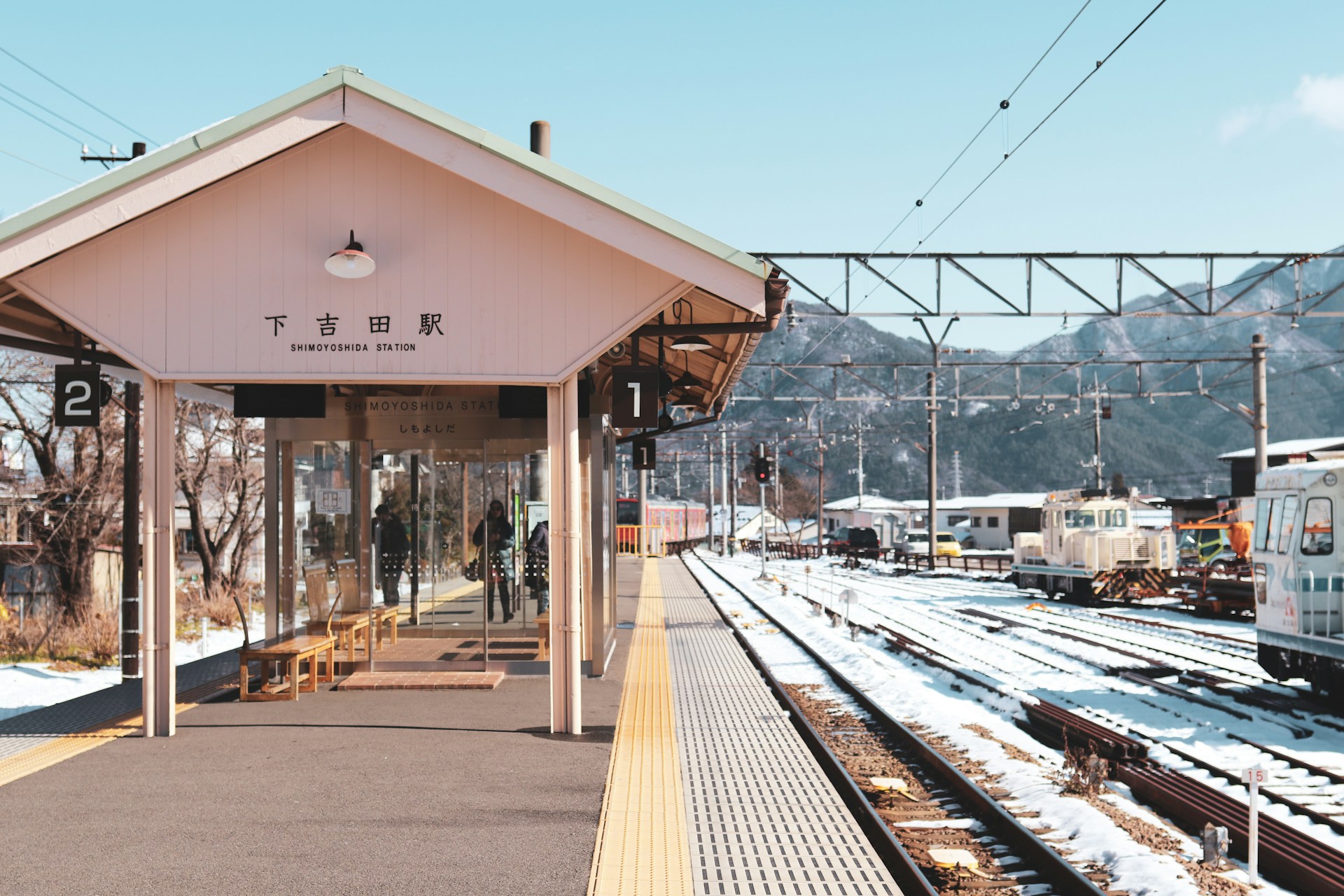
Upcoming Rail Projects and Innovations
The future of Japanese train travel is looking exciting, with several new projects in the pipeline. From the highly anticipated Maglev trains to expanded scenic railway routes, there’s a lot to look forward to. The Sagano Scenic Line, for instance, might see upgrades to enhance its already stunning experience through the lush Arashiyama area. These developments aim to combine tradition with cutting-edge technology, making scenic train rides even more memorable.
The Role of Technology in Enhancing Travel
Technology is playing a big role in shaping the future of scenic train travel. Smart ticketing systems, real-time updates, and AI-powered scheduling are just a few ways Japan is making train journeys smoother. Imagine a scenic train ride where augmented reality apps provide live information about the landmarks you’re passing by. This is not far off. For scenic train tours, like those on the Sagano Scenic Railway, these tech features could add a modern twist to the classic charm.
Sustainability Goals for Japan’s Railways
Japan is also focusing on sustainability in its rail innovations. Many scenic train routes in Japan are shifting toward renewable energy sources, aiming to reduce their carbon footprint. The Sagano Scenic Train, for example, could adopt greener technologies to preserve the natural beauty it showcases. Future scenic train rides might also include eco-friendly designs, from solar-powered trains to stations built with sustainable materials.
The blend of nature, tradition, and innovation is what makes Japanese train travel so special. As technology and sustainability take center stage, the future of scenic Japan looks brighter than ever.
Key Highlights for the Future:
- Introduction of Maglev trains for faster, more efficient travel.
- Enhanced onboard experiences with augmented reality and smart features.
- Increased focus on eco-friendly scenic railway operations.
- Potential upgrades to iconic routes like the Sagano Scenic Line.
The future of scenic train travel in Japan is not just about speed or efficiency—it’s about creating unforgettable journeys that connect people with the heart of the country.
As we look ahead, scenic train travel in Japan is set to become even more exciting. With breathtaking views and comfortable rides, these trains offer a unique way to explore the country’s beauty. Imagine gliding through lush landscapes and historic towns while enjoying the journey.
If you’re planning a trip, don’t forget to check out our website for the best Japan eSIM data plans to stay connected during your travels!
Wrapping Up Your Rail Adventure
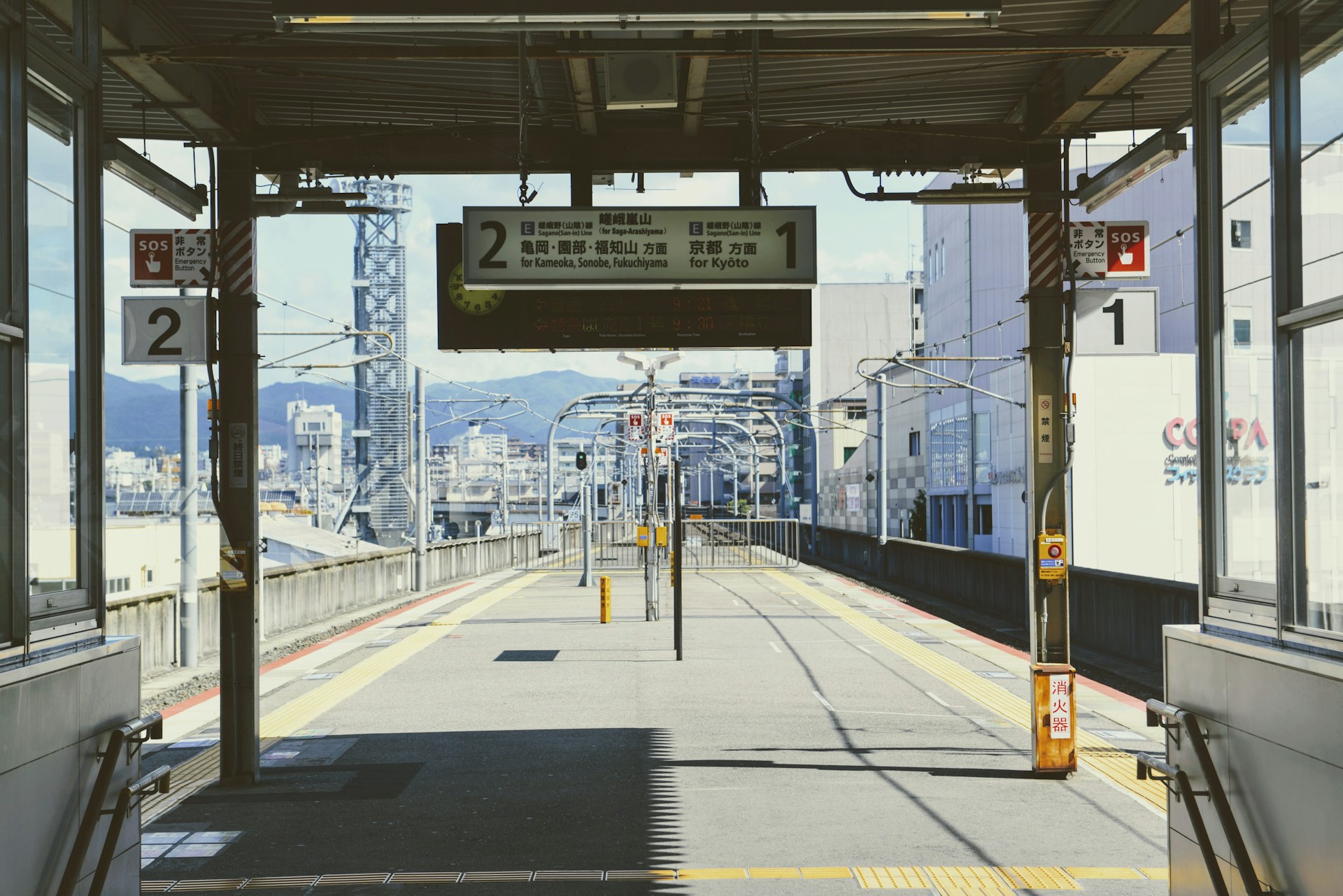
Traveling through Japan by train is more than just getting from one place to another—it’s an experience all on its own. From the sleek Shinkansen speeding through the countryside to the charming local trains that wind through small towns, every ride has its own story. Whether you’re snapping photos of Mount Fuji from your window or chatting with locals on a quiet rural line, there’s something magical about seeing the country this way. So pack light, grab your rail pass, and let the tracks guide you to new adventures. Japan’s railways aren’t just a way to travel—they’re a journey you’ll never forget.

Seamless Mobile Data Everywhere







